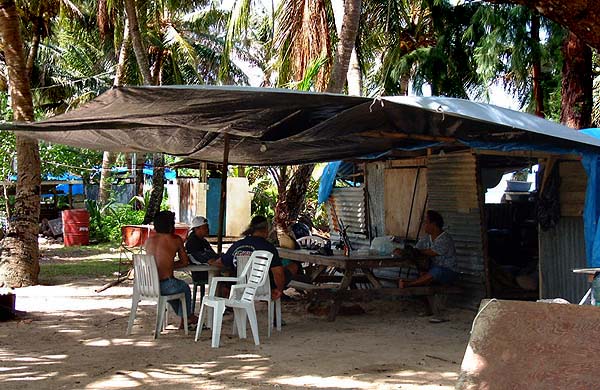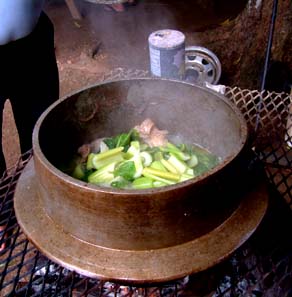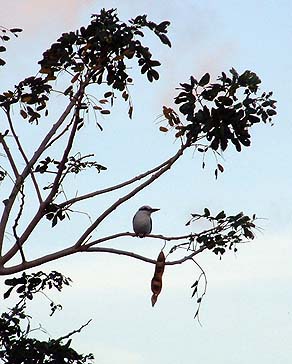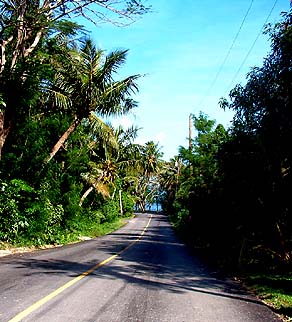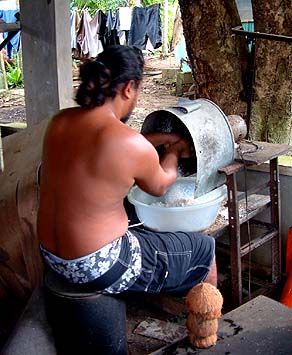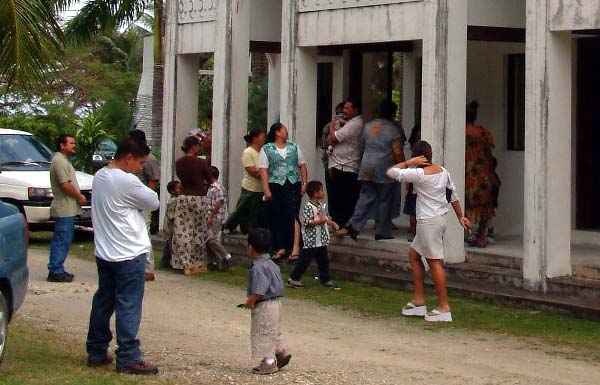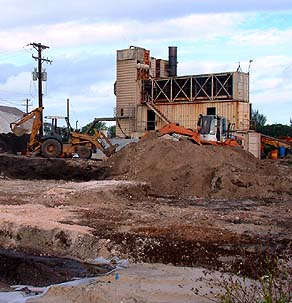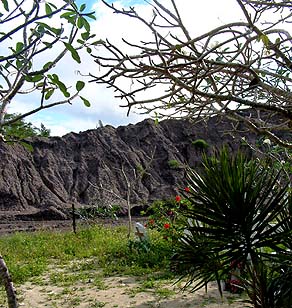 |
 |
 |
|||||
|
|
|
|
|
|
|
|
|
|
|
|||||||
|
|
|
|
An afternoon of company at Rosa Tenorio's place.
|
|
“After being absent for so many years, I see a lot of changes,” says Rosa Tenorio. “Back when I was a young girl growing up, we really never had to go to bed locking our doors or closing our windows because of crime. There was no such thing as crime. But ever since the United States came in and took over, a lot of crime has come about with all of the changes. "And people are not too friendly. When I’m saying not too friendly, they just don’t have any more time for family. It seems like the family roots are beginning to disappear. Years and years ago, if you cooked something, you always cooked a lot so you can give it to the neighbors, family. We were surrounded by family. One person was always related to the next person, so there was a lot of sharing.”
|
||
|
|
||
“Now that I’ve been back, I can see that has really gone. There is less sharing. People are so much into themselves; even if you meet your first cousin down the street, to say ‘Hi’ is such an effort. It’s a whole new generation of Americanized people. When I say ‘Americanized,’ I’m not degrading the American system. I’m just saying that I think we’ve just, in a way, advanced to a point where we’re forgetting relatives. We’re just not making time for anybody anymore. “And I see that in the States. Even when you live next door to a person, you don’t even know who your neighbor is. And I’m kind of sad about that. But my own belief is that when there’s a lot of money poured into such a small island where people have really never had much money, and all of a sudden they’re surrounded by it, greed plays a big part. And when greed plays a big part, you forget that at one point in time we were very, very close. The family unity is beginning to fade.”
|
|
|
“We all started getting together,” Juan says, “and we formed a group called the Tanapag Action Group. We had all gone abroad to be educated, and when we all came back, we realized that our community was at the top place of the judicial system with arrests, juvenile delinquency, you name it. "And there were some members and top officials of the Department of Public Safety that were our classmates. They also went to school abroad, came back, and became the top brass of the department, and so at times whenever we got together, they’d say, ‘You know, the judicial system’s objective is to stop this Tanapag domination in the community,’ because we’ve been perceived as a troubled community."
|
|
|
|
“People are afraid to drive into this village. If there is a party, they will be here in the daytime, but after sunset, the only people that are left are people from the village. And so that is how the village is perceived. And so the objective of the judicial system was to put everybody in jail, to stop the problems. So we said, 'You know, we were never bad people. What’s wrong? Where did we disconnect?' "So I said, ‘Well, if we don’t take action now, nobody’s going to do it for us,’ so we did. Whenever we see problem kids, we go and talk to them. Things used to be worse. Three, four, five years ago, in the evening, you would hear gunshots all over. People shouting, cars drag racing in the village. So at least that has stopped."
|
||
|
|
||
“Ben Sablan, myself, Vic, a lot of us, we all just got together. If there’s troubled kids, we go there and say ‘What do you want? Want to fight? That’s what you want? You want to show us that you’re strong?’ They were stunned, because I guess these kids never knew that somebody’s been watching them. Then we started inviting them, ‘Why don’t you come join us?’ And the answer was 'Yes.' So we started changing the attitude. “Now it has become peaceful again, and you don’t hear all of those problems anymore; we did it the best way we knew how, and I guess it worked. We know that family members have tried to be patient and talk to them, but you know, we understood the kids. We took the rough road, too. We were there once."
|
|
|
"And we also started bringing back the old system, that you have work, that everybody participates. You can see that at funerals. Every night for nine nights they’re serving solid food, and that ranges $1,000 to $3,000 dollars a night. "They can manage it only because all the family and extended family and friends and members of the community will bring things and give them without any expectation of repayment. They just help. We've started doing that again “We also formed the Tanapag Youth Action Group. These are our kids; and whenever there’s work, we just put them together and say ‘All right, you all go and help.’ I ask my daughters to ‘get a case of chicken, get a case of grapes and get a sack of rice.’ Ben, Vic, they’ll do the same thing, and we all take that and say, ‘Just give it to this family. Here’s help from the community'."
|
|
|
|
Tanapag folks mingling after church.
|
"Then we started changing a lot of things in the village, like fiesta. People used to donate, and they get tired of giving, giving, giving; so we started coming up with a long-range plan for next year. We started fund raising, collecting money here and there, so when fiesta comes we just give them a note saying, ‘If you want, you may contribute,’ but we don’t tell them an amount, unlike before when they were told to donate. "Now we just tell them ‘We’re going to have fiesta. You are more than welcome to contribute if you want, but the fiesta is ours, please come and help.' So they started opening their eyes, and we continued to emphasize that ‘We need you more than your money or whatever. It’s you we need.’ So we can see that attitude started changing." "Right now the community is being broken up by politics," Dave adds, "but there is always a way to remember that the culture is still there in the community. When there is a fiesta on our island or in our community, people will get there, they disregard the politics and they come in and help for the fiesta in the community."
|
||
|
|
||
“We still believe today that the entire village is contaminated with this chemical that causes cancer,” Ben says, “and we need to communicate effectively with two agencies of the Federal Government: the U.S. Environmental Protection Agency, and the U.S. Army Corps of Engineers. The Tanapag Action Group approached them primarily because of the widespread contamination of PCBs in this village. “The original people who started out doing this are people with a background in science like myself, with a background in education, and who are feisty enough to say, ‘You’re going to have to talk us to remediate the soil in the village.’ And today the event has brought us to where they’re now treating the contaminated soil."
|
|
|
“After our work regarding the PCBs, we did not discontinue. We thought we should continue and pressure government agencies with regards to other social problems, such as raw sewage being dumped into our lagoon. Being a fishing village, we’re very concerned on raw sewage. Now we’re experiencing overflows of raw sewage that go right on to our beaches and into the lagoon. "We thought TAG should concern itself with this kind of situation so things can be rectified. We communicated with people involved, the government agencies such as the Commonwealth Utility Corporation. We talked to the local Division of Environmental Quality. We talked to the Coastal Resource Management Office. They’re all enforcement agencies. We talked to the Division of Fish and Wildlife, and got their assistance in preventing or rectifying these problems that we encounter."
|
|
|
|
Soil awaiting treatment.
|
“We’re not finished with the Federal Government. We’re still talking about the two military dumpsites. Those are FUDS, ‘formerly used defense sites,’ and we’re still talking about the oil containers from the old fuel farm. And we’ll continue to talk about heavy metals pollution, we’ll continue to talk about POPS (Persistent Organic Pollutants) or COCS (Chemicals of Concern). These are in existence today in the village, and they’re not going to just fade away. We’re going to actively involve ourselves in getting the right agencies to come and either remediate or characterize one more time. The whole village is a FUDS site. "We have more work to do in the future, and we’re trying to involve our young children in learning and understanding what is happening in the village, so that they can take over as we pass the torch to them.”
|
||
|
|
||
Teaching the youth of Tanapag about the values of the community, and finding new ways to re-instill a sense of cultural identity to confront the future, are ways that the leaders of Tanapag are replanting.
|
||
|
|
||
|
|
|
|
|
|

|
| Tanapag Home | Map Library | Site Map | Pacific Worlds Home |
|
|
|
|

|
|
|
|||
| Copyright 2003 Pacific Worlds & Associates • Usage Policy • Webmaster |
|||
